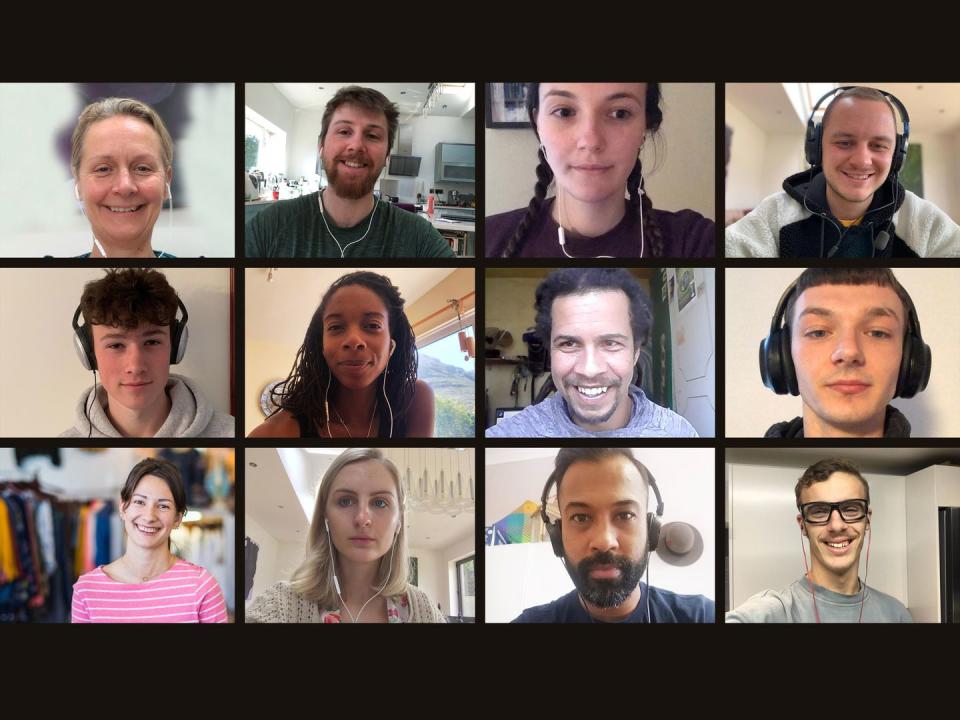Creative Ways to Build Your Professional Network

Company happy hours, exchanging business cards at college alumni events, meeting up with an old colleague—these are just some of the ways that we used to network in person. Since these events are a lot less common these days, it’s a great time to get creative and tap into the online side of networking...and this is definitely the time to network! You may find that your potential connections are much more likely to respond, especially to "cold call" networking emails. "I recommend setting time aside every day to come up with a dream list of people to network with, and start sending those cold e-mails to initiate a connecting conversation on Zoom or by phone,” says Ashley Stahl, SoFi career expert. “Always remember to ask how you can support them as well so that you remain a giver in your network.” That’s a key aspect to remember. People want authentic connections, so make sure you invest in your contacts and pay it forward.
People are thriving by tapping into digital resources to not only keep their current network alive, but also expand it. Whether you’re looking to grow your network because you’re out of work, or just looking to build up your professional network for future opportunities, resources like LinkedIn are proving invaluable. If you’re out of work, this is also a great time to stop and figure out what you’re passionate about. You may find that making a career pivot will open up new avenues for you to pursue as you form relationships with your peers. Here are some other creative ways to build your professional network...

When’s the last time you looked through your list of LinkedIn connections? If you can’t remember, it’s time to start. Think about your network, both online and off. If you attended college, get active in your alumni chapter. Your network doesn’t end at the professional level. Focus on all of your interests outside of your industry, like hobbies, fitness, charity work, parents groups, and more. Interacting with as many people as you can will get your message out. If you haven’t connected with your contacts in a while, send a quick note to check in. That will make it easier to ask for an introduction (and recommendation, if you need one).

Christina Appleton considers herself a professional networker, something that she’s found challenging when in-person events aren’t an option. “I have joined about six different Slack ‘workspaces’ focused on my industry and/or job function, and have joined three different Facebook groups,” says Appleton, CEO and founder of Appleton’s Market. There are more than 10 million groups on Facebook, offering a ton of great options to customize your networking experience. Appleton has made five new “work friends” and also kept her pre-existing network warm by inviting those people into the group. She’s also found another perk: saving time. Instead of spending a few hours at an in-person event, she’s devoting about 20 minutes a day to these online groups.

If you’re looking to make a career switch post-pandemic, now is the time to make sure you consistently update your social media profiles to shine against the increased competition. This is especially important as you won’t get the typical face time with a potential employer or other potential coworkers through the interview process. “More than 95% of recruiters admit that they use LinkedIn for hiring on a regular basis, and out of the 645 million LinkedIn accounts, less than 0.5% are actually contributing new content,” says Stahl. “Be the 0.5% that stands out by refreshing and adding new skills, posting thoughtful content, and positioning yourself as the best candidate even in this ‘stay-at-home’ virtual world that we’re in.”

A lot of trade associations and professional organizations have moved conferences to a digital platform, and many of them are free. Some of these events have “matchmaking” sessions where you can make new contacts and grow your network. “Make it a point of signing up for one or two a week and then following up with speakers or panelists and other attendees you meet in the virtual breakout rooms,” says Lydia Loizides, founder of Talentedly.

Think about hosting a seminar or Q&A on Zoom as an industry event. Invite people in your network and give them a key for a plus one invite. Send invites to people you admire or want to work with. “Make the emails personal and not just a copy paste situation,” says Ian Kelly, VP of operations at NuLeaf Naturals. “People will like that you have taken the effort and know why you reached out to them specifically.” Kelly encourages you to record the seminar for people who can’t make it to the live event. “It is a great opportunity to talk about your skills, or a topic that is generating buzz in your industry,” he says. “You can even invite people to speak on the panel, as they are usually more likely to participate if their expertise is being shared and their businesses promoted.”

One of the biggest mistakes business professionals can make is looking only for people involved in their specific industry. “This narrows down their networking opportunities significantly,” says Chris Holder, financial coach and author. “Explore other trades or niche groups and be open to meeting people you normally wouldn’t have in your circle. This can actually be one of the most successful ways to find people who need something you have.” Invite people you know, as well as those you don’t, but would like to know better.

"One of my best pieces of advice for building a professional network amid COVID-19 is to network via Twitter chats,” says Deborah Sweeney, CEO, MyCorporation.com. “Join one that is relevant to your industry each week. Use this time to answer questions asked during the chat and share your insight with other participants. Have fun with the chat! Use GIF images with your responses and reply to other participants to start a conversation together and follow one another. Join the chat as often as you're able and, if you're ever in the position to do so, offer to co-host one yourself.”

There are a lot of great tech startups that are bringing networking to a whole new level. “One of the best we've tried and recommend to all of our clients is Lunchclub, an AI-based networking app that pairs you, one-on-one, with a person with similar professional goals and interests,” says Loizides.

Virtual volunteering is another great way to expand your network—companies like Catchafire and Taproot pair professionals with specific skills with not-for-profits looking for help. Loizides recommends this to clients looking to grow their network and shore up professional skills and experiences at the same time.

Let your website do the networking for you. “Use your ‘About Me/Us’ page to tell people exactly what you're looking for in a networking partner,” says Beth Bridges, The Networking Motivator. Let people discover who you’re about in your description. Then, tell them what’s in it for them. What do you do for people in your network? Do you like to connect them with resources? Are you all about sharing their blog posts? Tell them exactly how to add you to their network. “Don't worry, when you put just a tiny barrier, you won't have thousands of people, only those who are serious about building relationships,” she says. “Then, make sure that you follow up on your promises and stay connected to your new contacts.”

Now more than ever, it's important to diversify your network and consider opportunities that might be outside of your usual field, especially if you are in the market for a job. “Cast your net wide and meet new people, and opportunities, by attending webinars, chat rooms, and conferences that are outside your line of work,” says Darrell Rosenstein, founder of The Rosenstein Group.

It sounds a little off the wall, but if you work in the tech space, there are a lot of SaaS brands in need of people to objectively critique their products. “For starters, volunteering as a beta-tester will naturally allow you to interact with folks aligned with your industry,” says Ty Stewart, CEO and president of Simple Life Insure. By using these products, you’ll also probably learn some specific tech skills that’s relevant for your own career. “You can then turn around and connect with those individuals you worked with on LinkedIn for further networking and engagement,” says Stewart.

Struggling to stay on someone’s radar? Record a podcast about it. “A podcast is a selfless way to get on anyone’s calendar for an hour,” says Alex Strathdee, CTO at inPerson. “It's a fantastic way to get someone you've been dying to network with to dedicate some time to building a relationship. What's great is that, if you blast it out on your social, someone else might benefit from the conversation as well.”
Creative Ways to Build Your Professional Network
Company happy hours, exchanging business cards at college alumni events, meeting up with an old colleague—these are just some of the ways that we used to network in person. Since these events are a lot less common these days, it’s a great time to get creative and tap into the online side of networking...and this is definitely the time to network! You may find that your potential connections are much more likely to respond, especially to "cold call" networking emails. "I recommend setting time aside every day to come up with a dream list of people to network with, and start sending those cold e-mails to initiate a connecting conversation on Zoom or by phone,” says Ashley Stahl, SoFi career expert. “Always remember to ask how you can support them as well so that you remain a giver in your network.” That’s a key aspect to remember. People want authentic connections, so make sure you invest in your contacts and pay it forward.
People are thriving by tapping into digital resources to not only keep their current network alive, but also expand it. Whether you’re looking to grow your network because you’re out of work, or just looking to build up your professional network for future opportunities, resources like LinkedIn are proving invaluable. If you’re out of work, this is also a great time to stop and figure out what you’re passionate about. You may find that making a career pivot will open up new avenues for you to pursue as you form relationships with your peers. Here are some other creative ways to build your professional network...
It's time to dial into the great digital tools available for staying connected.
Solve the daily Crossword

